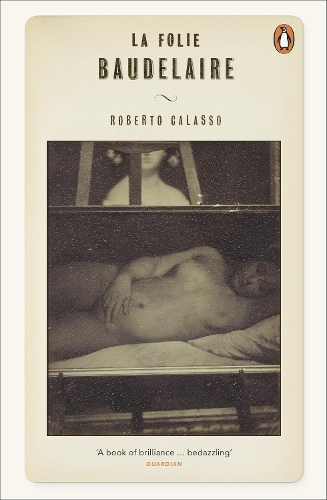
La Folie Baudelaire
(Paperback)
Publishing Details
La Folie Baudelaire
By (Author) Roberto Calasso
Penguin Books Ltd
Penguin Books Ltd
27th August 2014
3rd July 2014
United Kingdom
Classifications
General
Non Fiction
Literary studies: c 1800 to c 1900
841.8
Physical Properties
Paperback
400
Width 130mm, Height 198mm, Spine 22mm
291g
Description
An original and perceptive reconsideration of literature and art in nineteenth-century Paris, now in paperback In this lavishly illustrated book, Calasso turns his attention to the poets and writers of Paris in the nineteenth century who created what was later called 'the Modern'. His protagonist is Charles Baudelaire- poet of nerves, art lover, pioneering critic. With Baudelaire's critical intelligence as his inspiration, Calasso ranges through his life and work, focusing on two painters - Ingres and Delacroix - about whom Baudelaire wrote acutely, and then turns to Degas and Manet. In a mosaic of stories, insights, dreams, close readings of poems and commentaries on paintings, Paris in Baudelaire's years comes to life.
Reviews
Roberto Calasso [is] the most inquisitively suggestive literary critic in the world today . . . -- Thomas McGonigle * Los Angeles Times *
What a rare and special book this is, from its opening paragraph . . . But then what a rare writer is the prolific, post-Calvino Italian master Roberto Calasso-72-year-old scholar, translator, author of film scripts, radio and television adaptations, operatic librettos and seemingly most other viable prose forms in the late 20th and early 21st centuries . . . [La Folie Baudelaire is] an ideal introduction in English to one of the most urbane and readable of living masters. * Jeff Simon, Buffalo News *
Arresting observations on painters and paintings alike, aided and abetted by some discriminatingly chosen illustrations, beautifully reproduced . . . La Folie Baudelaire is bedazzling. * Alex Danchev, The Guardian *
It is a gorgeous, willful, and convincing re-staging of Baudelaire's style . . . * Adam Thirlwell, The New Republic *
Smoothing the way is the curiously conversational tone in which even the most arcane information is conveyed, as well as the underlying sense that, as the author piles detail upon detail, he's having a huge amount of fun. Calasso may identify with his hero, but there is no Baudelairean melancholy in his work. There's no show-off either-only a sincere delight, an innocent reveling in his own encyclopedic mind at play. This mood is catching, and if one adopts the right dreamy pace, one can commune with Calasso through a kind of imaginative osmosis. * Andrea Lee, New Yorker *
[Roberto Calasso is] an ambitious artist-critic, pushing the subject as far as he can, bent on penetrating the mind of both Baudelaire and his time. In the process, he delivers plenty of insight. . . Tough but rewarding, written with bold intelligence and panache. * Kirkus *
[Roberto Calasso is] a writer about the foundational myths and tales of human society who has no equal in the sparkle of his storytelling and the depth of his learning . . . His writing . . . these lost voices speak again, in magical, uncanny and something even sinister ways . . . * Boyd Tonkin, The Independent *
Author Bio
Roberto Calasso was born in Florence in 1941. An author and publisher, he began working at Adelphi Edizioni from its founding in 1962 and continued as director for fifty years. The Book of All Books is the tenth part of a series that began with The Ruin of Kasch and includes the international bestseller The Marriage of Cadmus and Harmony as well as Ka, K., Tiepolo Pink, La Folie Baudelaire, Ardor, The Celestial Hunter and The Unnamable Present. He died in Milan in 2021.
